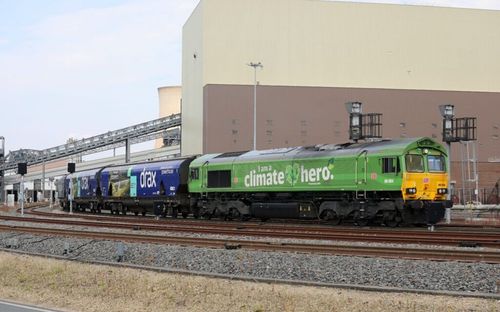DB Cargo UK delivers HVO-powered services for Drax



SOURCE: Drax Group plc
August 21, 2024
BY Drax Group plc
DB Cargo U.K. has announced that all trains it operates for Drax Group in and out of the U.K.’s largest renewable energy plant near Selby, will be powered by environmentally friendly hydro-treated vegetable oil (HVO) having switched entirely to the fuel.
Drax Group, the U.K.’s leading producer of renewable energy, has taken the decision to switch to the 100% renewable fuel as part of its ongoing program to reduce its carbon footprint.
DB Cargo U.K., currently transports around 4.5 million metric tons of biomass pellets to Drax Power Station each year, operating around 60 trains a week – approximately 3,000 trains a year – to the site.
It is estimated that by switching from traditional red diesel to HVO will reduce rail freight carbon emissions by up to 90%, saving over 12,000 tonnes of carbon each year equivalent to 30 million miles worth of car journeys1.
Advertisement
The DB Cargo trains powered on HVO will provide around 57% of Drax’s total biomass, helping the global energy leader produce enough renewable electricity to power almost 2.3m homes, equivalent to all of the households in Yorkshire and the Humber.
HVO is marketed as ‘one of the world’s purest and greenest fuels.’ It is synthetically made through the hydro-treatment process from vegetable oils or animal fats which significantly reduces harmful carbon dioxide (CO2) and nitrogen oxide (NOx) emissions when used in diesel vehicles and machinery.
It is derived from 100% waste products and no virgin products are used in its manufacture.
DB Cargo U.K.’s Chief Sales Officer Roger Neary said the decision by Drax to adopt the use of HVO in its trains was a win-win for both companies. “The Government had set the rail industry a stretching target to achieve net zero carbon emissions by 2050 and remove all diesel only traction by 2040 so the use of HVO in our trains will go a long way to helping us meet that challenge,” said Roger.
“At the same time, it will help Drax meet its own sustainability targets and minimize its impact on the environment,” added Roger.
Advertisement
Roger concluded that ‘Until a firm commitment is made to electrification of the U.K. network, HVO is the only credible solution to rail freight decarbonization. More services could be operated with HVO if the right policies and incentives were in place to enable more customers to make the switch.’
Rail freight is critical to the power station’s supply chain, transporting large volumes of biomass pellets to the plant which produces around 8% of the U.K.’s renewable power.
Bruce Heppenstall, plant director at Drax Power Station, said rail freight was already a more sustainable method of transporting the pellets than road, taking some 192,000 HGVs off the U.K.’s network each year.
“We are proud that DB Cargo’s HVO powered trains, service Drax Power Station. We are committed to decarbonizing our supply chains and, through deploying the carbon removals technology, bioenergy with carbon capture and storage, we aim to become a carbon negative business.
“Drax Power Station uses high volumes of biomass to keep the lights on for millions of homes across the U.K. Rail freight is a cleaner and greener option for transporting this material and our partnership with DB Cargo prevents thousands of additional journeys by HGVs across the U.K.’s road network.”
Related Stories
The U.S. Energy Information Administration maintained its forecast for 2025 and 2026 biodiesel, renewable diesel and sustainable aviation fuel (SAF) production in its latest Short-Term Energy Outlook, released July 8.
XCF Global Inc. on July 10 shared its strategic plan to invest close to $1 billion in developing a network of SAF production facilities, expanding its U.S. footprint, and advancing its international growth strategy.
U.S. fuel ethanol capacity fell slightly in April, while biodiesel and renewable diesel capacity held steady, according to data released by the U.S. EIA on June 30. Feedstock consumption was down when compared to the previous month.
XCF Global Inc. on July 8 provided a production update on its flagship New Rise Reno facility, underscoring that the plant has successfully produced SAF, renewable diesel, and renewable naphtha during its initial ramp-up.
The USDA’s Risk Management Agency is implementing multiple changes to the Camelina pilot insurance program for the 2026 and succeeding crop years. The changes will expand coverage options and provide greater flexibility for producers.
Upcoming Events










